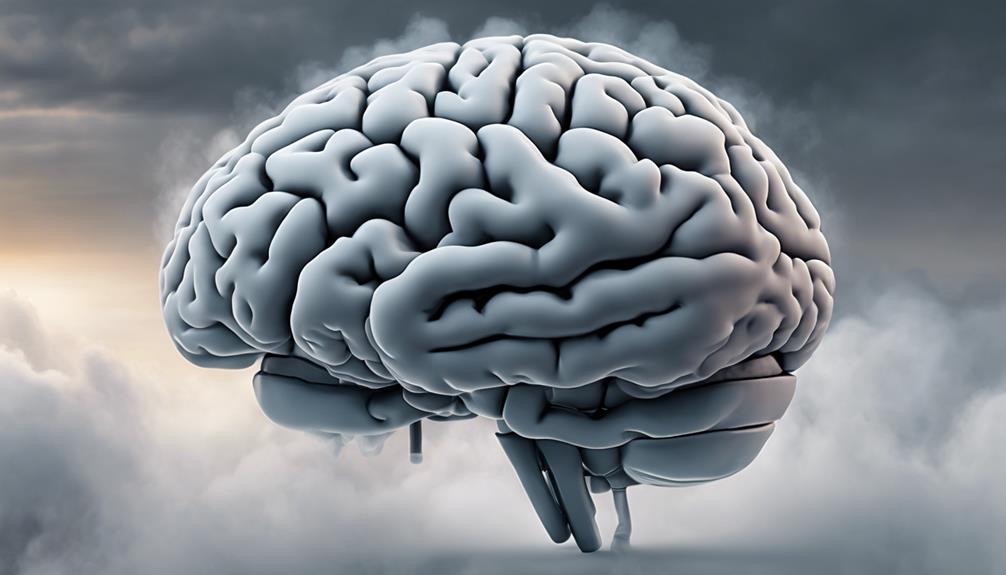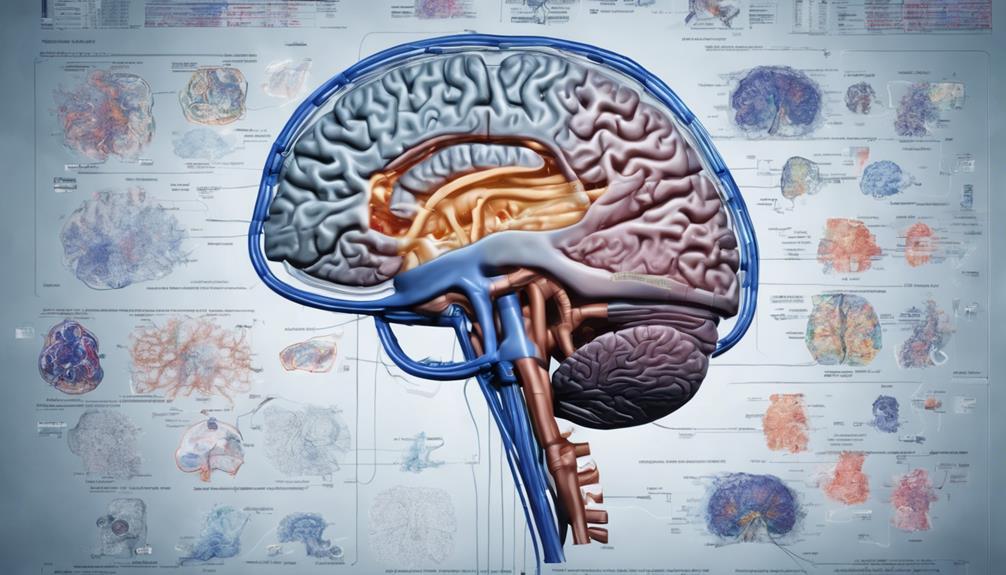Have you ever considered the potential effects of anesthesia on dementia, despite its well-known significance in surgical operations?
As we uncover more about the relationship between anesthesia and cognitive decline, a complex picture emerges, leaving us to question the implications for older adults undergoing anesthesia.
The findings may surprise you, prompting a deeper reflection on the risks and benefits associated with anesthesia in the context of dementia.
Stay tuned for a nuanced exploration of this intriguing intersection between medical interventions and neurological health.
Anesthesia and Dementia Risk
Exposure to general anesthesia, particularly inhalation anesthetics like sevoflurane, heightens the risk of developing dementia, as indicated by research findings.
Studies have shown that older patients undergoing procedures involving inhalation anesthesia, such as sevoflurane, may face an increased likelihood of cognitive decline and dementia compared to those receiving regional anesthesia.
The adjusted hazard ratios for dementia are notably elevated in individuals exposed to inhalation anesthesia, emphasizing the potential link between this type of anesthesia and long-term cognitive outcomes.
This association between inhalation anesthetics and dementia risk underscores the importance of considering the choice of anesthesia in perioperative management, especially for older patients who may already be at higher risk for cognitive impairment.
Further research, including randomized controlled trials, is necessary to confirm and better understand the impact of general anesthesia, particularly inhalation agents like sevoflurane, on the development of dementia in vulnerable populations.
General Anesthetics and Cognitive Function

Several general anesthetics, including sevoflurane, have shown varied impacts on cognitive function in studies conducted on older adults. These inhalation agents have been a subject of interest due to their potential role in cognitive decline.
Here are key points to consider:
- Research indicates mixed results regarding the association between general anesthetics like sevoflurane and cognitive function.
- Some general anesthetics may influence short-term cognitive changes in older adults.
- Ongoing studies aim to determine if specific general anesthetics heighten the risk of cognitive decline.
- Inhalation agents, a common type of general anesthetic, have been linked to postoperative memory decline.
- Anesthesia, particularly inhalation agents, can trigger structural changes in brain cells, potentially contributing to cognitive impairment.
Understanding the intricate relationship between general anesthesia, cognitive function, and older adults is crucial for healthcare providers to deliver optimal care and minimize any potential risks associated with cognitive changes post-anesthesia.
Surgery and Dementia Development
Following the exploration of general anesthetics and their impact on cognitive function in older adults, the focus now turns to the association between surgery and the development of dementia. Studies have indicated an increased risk of dementia in patients post-surgery, with different anesthesia types linked to varying levels of dementia risk. Older patients, particularly those who are frail, undergoing surgical procedures face a heightened risk of cognitive decline and dementia.
The postoperative period, encompassing both surgery and anesthesia, can induce brain changes and trigger inflammatory responses that are associated with cognitive impairment and dementia development. It’s noteworthy that the conditions necessitating surgery may also play a pivotal role in the onset of dementia, potentially overshadowing the direct impact of the anesthesia employed.
Understanding the intricate interplay between surgery, anesthesia, and dementia risk in older individuals is crucial for healthcare professionals in providing optimal care and mitigating the cognitive consequences associated with surgical interventions.
Anesthesia Impact on Aging Brain

Aging individuals undergoing anesthesia may experience heightened susceptibility to neurologic injuries, including postoperative neurocognitive disorders, due to changes in the brain that diminish cognitive reserve and increase vulnerability to surgical and anesthetic stresses. General anesthesia, commonly used in surgeries, can impact older patients’ cognitive functions and potentially increase the risk of cognitive decline and dementia. Specific anesthetics like sevoflurane have been linked to structural changes in brain cells, which may contribute to cognitive impairment.
- General anesthesia poses risks for cognitive decline in older patients.
- Postoperative neurocognitive disorders, including postoperative cognitive dysfunction, are concerns after anesthesia.
- Brain changes induced by anesthesia may elevate dementia risk.
- Sevoflurane and isoflurane are implicated in structural changes in the brain.
- Understanding the mechanisms underlying anesthesia-related neurocognitive disorders is crucial for improving outcomes in aging individuals.
Research on Anesthesia and Memory
Current research on anesthesia and memory reveals a significant correlation between exposure to general anesthesia, especially inhalation anesthetics like sevoflurane, and an increased risk of dementia. Studies indicate that patients undergoing general anesthesia have a higher likelihood of experiencing dementia compared to those receiving regional anesthesia.
Postoperative delirium, memory problems, and cognitive decline are commonly associated with anesthesia administration, particularly in older adults. Anesthetics such as sevoflurane and isoflurane have been linked to inducing structural brain changes that may contribute to cognitive impairment over time.
Furthermore, research suggests that anesthesia could exacerbate underlying dementia mechanisms, especially in high-risk individuals. Understanding the impact of anesthesia on memory is crucial for healthcare providers to consider when managing patients undergoing surgical procedures, particularly in the context of dementia risk assessment and postoperative cognitive outcomes.
The intricate relationship between anesthesia exposure and memory-related issues necessitates further investigation to enhance patient care and outcomes.
Frequently Asked Questions
Does Anesthesia Affect Dementia Patients?
Anesthesia may impact dementia patients.
Studies show a potential link between general anesthesia, particularly inhalation anesthetics, and an increased risk of dementia in older adults.
Research suggests that certain types of anesthesia can lead to Alzheimer’s disease-related brain changes.
Patients exposed to general anesthesia, especially inhalation types, may experience postoperative memory decline and cognitive issues.
The association between anesthesia and dementia risk warrants further investigation to understand its effects fully.
Who Shouldn’t Go Under Anesthesia?
When deciding who should avoid anesthesia, individuals with specific health conditions necessitating caution include those with a history of adverse reactions, advanced age, cognitive impairment, or predisposition to neurodegenerative diseases.
These factors can heighten risks of postoperative complications. Consulting healthcare providers is crucial for tailored assessments and recommendations based on individual circumstances to ensure safe procedural outcomes.
Are There Long Term Side Effects From General Anesthesia?
Yes, there are potential long-term side effects from general anesthesia. These effects may include cognitive decline and an increased risk of dementia.
Research suggests that exposure to certain anesthetics can lead to structural changes in brain cells and Alzheimer’s disease-related pathological changes.
It’s important to consider these risks, especially for high-risk individuals, as anesthesia may impact long-term cognitive function by increasing toxic protein levels in the brain.
What Is the Most Serious Complication of Anesthesia?
The most serious complication of anesthesia is postoperative delirium, affecting a significant percentage of older patients after surgery. It poses risks of cognitive decline, dementia, and mortality. Patients with delirium may experience longer hospital stays, functional decline, and reduced quality of life post-surgery.
Addressing and managing delirium is vital to prevent adverse cognitive outcomes and enhance patient recovery. Up to 10% of older patients may develop long-term cognitive decline following postoperative delirium.
Conclusion
In conclusion, our research highlights the intricate relationship between anesthesia and dementia, shedding light on the potential risks associated with certain types of anesthesia and surgical procedures.
As we delve deeper into the impact of anesthesia on cognitive function and aging brains, we must continue to explore targeted interventions to mitigate these risks.
Like a surgeon carefully navigating through delicate neural pathways, we must approach anesthesia administration with caution and precision to safeguard the cognitive health of our aging population.









